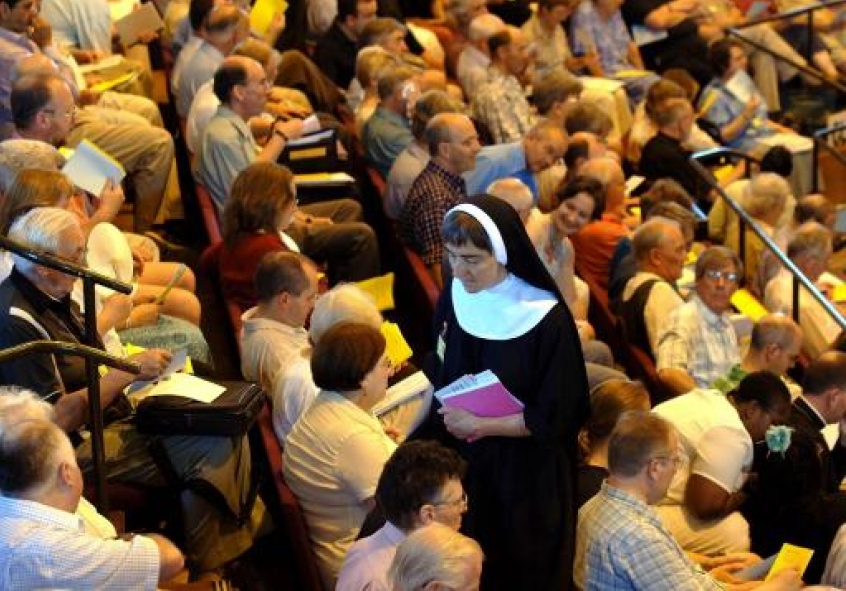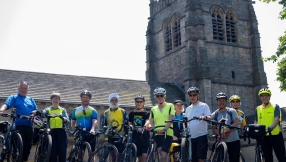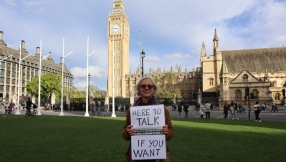
The Church of England's parliamentary body today gave its formal backing to the drafting of new legislation to allow women bishops.
The Archbishop of Canterbury, the Most Reverend Justin Welby, said the vote in General Synod had put "some momentum back into the process" after it flatlined last November when the previous draft legislation was defeated.
Opening the debate, the Bishop of St Edmundsbury and Ipswich, the Right Reverend Nigel Stock, said bishops were "urgent" to allow women into the episcopate.
"It is not simply because Parliament is looking attentively and impatiently at what we are doing," said Bishop Stock, chair of the working group on women bishops.
"It's because last November's decision caused profound mystification and unhappiness around much of the Church of England.
"It was a serious blow to our female clergy. It means that it will be at least two years longer than we had hoped before women are able to enrich the episcopate.
"So there is a degree of urgency however we look at it."
The motion passed today reflected the majority call for "the simplest possible legislation" in the Church's consultation document and instructed a steering committee to prepare a measure and amending canon making it lawful for women to become bishops.
It had the support of the House of Bishops and contained provision for those unable to accept women bishops and a mediation process for addressing grievances within parishes.
Provision for opponents
Much of the four-hour debate in Synod was over whether provision for traditionalists unable to accept women headship should be enshrined in law or rely more on trust.
Other options on the table before Synod proposed strengthening the legal framework around provision for traditionalists, including the requirement of a special majority for the removal of an Act of Synod.
Rod Thomas, of evangelical group Reform, criticised the proposals put before Synod, saying they lacked "sensitivity" and would not achieve the goal of "mutual flourishing" for supporters of women bishops as well as those who cannot in conscience accept them.
He said there was a "growing anxiety" among evangelicals that provision for opponents would not last without a clear legal framework, and that litigation may be started under Equality laws.
He pleaded with Synod not to start down a track "that will lead us to confrontation", but also stressed that most evangelicals in the Church of England did not wish to be in the same place as November.
"We do not wish to block the clear will of the majority to see women bishops in place," he said.
The Reverend Paul Benfield, from the Diocese of Blackburn, said a failure to enshrine provision for traditionalists in law suggested the Church of England was not serious about protecting them and ran the risk of "undignified disputes in the secular courts".
"Without law there is no certainty," he said.
"We put into law such relatively unimportant things such as who should minister the chalice at Holy Communion. Yet … who actually celebrates the Sacraments will be left to discretion."
However, his amendment asking that provision for opponents of women bishops be made by measure or regulations made under canon was lost in all three Houses of Synod.
Simple legislation
In the end, Synod backed the simple legislation option with an amendment from the Bishop of Dover, the Right Reverend Trevor Willmott, adding a mandatory grievance procedure for parishes in which diocesan bishops would be required to participate.
Expressing his own support for the simplest legislation, Archbishop Welby said: "History and contemporary experience show that detailed arrangements not only embed division, they are also unworkable and lead to frequent and prolonged litigation.
"My last 12 months' experience with parliamentary banking standards has shown this very adequately."
Dr Paula Gooder, from the Diocese of Birmingham, welcomed the motion, saying it gave the Church of England "new headwind" to move it away from a place of "mauling each other" over the issue of women bishops.
"Option one offers us an open box with a spaciousness for a different way of doing things," she said.
"It has potential to be enormously robust if we run the process correctly, to give us that new headwind, that headwind into the future that will say we will never do that to each other again."
The Reverend Canon Rosie Harper, from Oxford Diocese, said the simple legislation meant all Anglicans would "remain as equals" within the Church of England.
The need for legislative safeguards, she said, would "inevitably splinter the Church and risk minorities becoming seen as niche, a boutique part of the Church rather than full members".
"Option one sells nobody short but it does require looking at the issue through different lenses," she said.
Canon Harper went on to say that there were additional global ramifications in allowing women bishops.
"One of the biggest faultlines in today's humanity is the appalling way in which women around the world are treated in the name of tradition and religion," she said.
"If our own Church enacts legislation which is anything less than 100% equal we are adding to the burdens of the oppressed."
She drew attention to the campaign against female genital mutilation in Britain on the grounds of tradition and religion.
"Were we to enact legislation which legitimised any form of discrimination I believe we would be colluding with that argument and letting down oppressed women around the world.
"Option one offers a fresh hope we can remain equally part of this one Church and we can show the world at last that our God has equal regard for all his created children," she said.
Continuation of facilitated discussions
The Bishop of Willesden, the Right Reverend Pete Broadbent proposed that, going forward, the draft legislation should be prepared by a steering group made up of supporters and traditionalists who would take part in joint discussions facilitated by trained mediators.
"It might work. It's a way of doing things differently and we might avoid the train crash," he said.
Keith Malcouronne, of Guildford Diocese, said his amendment proposing a continuation of the facilitated conversations could be a tool to realise Bishop Broadbent's vision.
The amendment, which was carried, asked that facilitated conversations be used at significant points in the formulation and consideration of the draft legislation.
Archbishop Welby said he strongly supported the proposals but cautioned that even with further facilitated conversations, it would still take "hard work and generosity to have any effect".
"There are neither magic processes any more than there are magic solutions that get us off the hook of needing a commitment to mutual flourishing," he said.
"The approach before us is a radical way forward. It revives the possibility of building trust. It gives us space for imagination and it affirms an inclusive approach that is consistent with our previous resolutions."
First consideration stage for the new draft legislation is due to be taken at the November 2013 group of sessions, with a draft Act of Synod or draft declaration to be brought before Synod for consideration at the February 2014 group of sessions.
The draft legislation will seek to encompass five principles designed to keep supporters and opponents of women bishops together:- • once legislation has been passed enabling women to become bishops of the Church of England, due respect and canonical obedience to those the Church of England has ordained and appointed to office • anyone who ministers within the Church of England must then be prepared to acknowledge that the Church of England has reached a clear decision on the matter • the Church of England will acknowledge that its own clear decision on ministry and gender is set within a broader process of discernment within the Anglican Communion and the whole Church of God • the Church of England will remain committed to enabling opponents to flourish within its life and structures • pastoral and sacramental provision for the minority within the Church of England will be made without specifying a limit of time and in a way that maintains the highest possible degree of communion and contributes to mutual flourishing across the whole Church of England
Archbishop Welby said it was essential that the five principles have strong boundaries and "command wide support and ownership" across the whole Church.
He said: "They must be discussed, debated and agreed, be very robust and closely followed and monitored. Essentially they are to be the electrified ring fence."
The motion, as amended by the Bishop of Dover and Keith Malcouronne was passed by 319 votes in favour. However, with 84 votes against and 22 abstentions there are already concerns that the ensuing legislation will meet a similar fate to the previous draft legislation.
Speaking to reporters after the vote, Archbishop Welby acknowledged the outcome fell short of the two-thirds support in each of the three Houses that will be required to pass the legislation.
However, he said the mood in Synod was "infinitely better" than last November and that he remained optimistic.
"There's a strong desire to get it done. We aren't at the stage of saying 'Should we ordain women as bishops?'. We are at the stage of saying 'We are going to ordain women as bishops, how do we go about that?'.
"It's going to take a little while, we're going to have to keep working at it. There's been such a shift in mood over the last six months and therefore I remain extremely optimistic."









